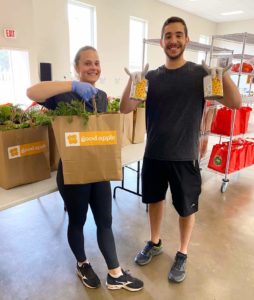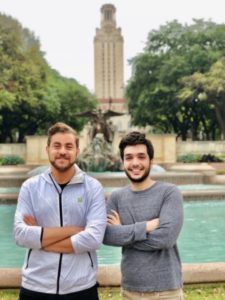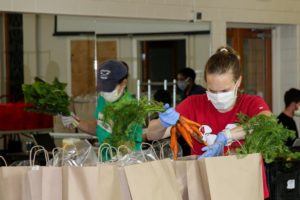As Texas starts to head into the next phase of our new normal, many vulnerable populations are still struggling to access food and other supplies. These four University of Texas student startups have stepped up to help mitigate this crisis and are continuing to help those in need across Texas.
Good Apple: 90,000 meals for people with insecure access to food.
Access to nutritious food has been a problem in Travis County since before the pandemic hit. Good Apple, a company co-founded by third-year Dell Medical School student Zack Timmons, has been delivering boxes of local, organically grown produce to food-insecure families since 2019.

Amid the COVID-19 crisis, the problem of accessing stable food supplies became more complicated as Texans were told to stay at home. In late March, fourth-year Dell Medical School student Garrett Johnson approached Timmons with an idea to address Austin’s pandemic food needs. By late April, their “Stay Home, Stay Healthy” program delivered more than 130,000 pounds of food, enough for 93,000 meals, to almost 5,000 people.
“It’s really important to focus on health issues but not only those that occur in the hospital or clinic,” said Timmons. “Things like housing, education, food security — are key parts to people’s health and maybe even affect their health more than what we can do in a doctor’s office.”
The “Stay Home, Stay Healthy” food delivery program works to help elderly people and those who are immunocompromised. Travis County residents in need of food assistance who are 55 or older or who have an underlying health condition can apply to receive free assistance from Good Apple. In addition to produce, community members in need receive grocery staples such as milk, rice, pasta and canned protein.
Along with Timmons and Johnson, most of Good Apple’s 15 team members are current or former UT students. The team has partnered with Hope Food Pantry Austin, the Austin Transportation Department and Capital Metro to scale up deliveries to help families and community groups.
“This is just such a huge time of need for the community, especially for the population that’s at most risk of bad outcomes from COVID-19,” Johnson said. “So just having the opportunity through Good Apple and all of our other partners to provide for that community so that they can stay home, stay healthy — it’s really gratifying work, and I’m honored to be a part of it.”
Dell Medical School has started a HornRaiser campaign to collect donations to support Good Apple’s efforts.
K.O.vid-19: Connecting volunteers with people who need help during isolation.
The Center for Disease Control and Prevention has recommended that people with higher risk of major illness, for example, older adults and individuals with underlying health conditions, to not leave their homes unless absolutely necessary. This has led to health professionals advising at-risk patients to have friends and relatives shop for them. But some people don’t always have that network readily accessible to them where they live.

UT computer science senior Amir Mostafavi realized this when his grandmother, a Dallas resident, called and asked whether he could buy her groceries. “I was still in Austin,” Mostafavi said. “I had to call one of my friends who was in Dallas to go help her out.”
He suddenly realized this process could be streamlined, getting the idea for a website where “people who need help can sign up, people who are willing to give help can sign up, and then we match them together.” Mostafavi was joined by his friend Ali Ajam and they got right to work.
After more brainstorming and a few days of developing, K.O.vid-19 (kovid19.org) was launched in early April. Mostafavi said, “we believe our site can help people K.O. or knock out, COVID-19 together.”
Users on the site have the option to help others or request help, with categories such as grocery shopping, dog walking, and technology. After taking users’ names, phone numbers and ZIP codes, it then automatically matches people who are in the same ZIP code and help category.
Once a match is made, each person gets a confirmation text with details on how to contact their helper or requestor. All this is done through an intermediary number in order to protect both parties’ real phone numbers. Users also have the freedom to easily “unmatch” to get paired up again or “exit” to opt out entirely.
Today, kovid19.org has over 300 users signed up. “I was checking through some of the ZIP codes that we have and they’re from all over the place — New York, Texas, even Mississippi, Kansas,” said Mostafavi. “We have lots and lots of people wanting to help.”
They are both eager to see where this site will go. “People love the idea! We just need to find a good channel to spread the platform to let people know that it exists. And hopefully then it can be a good use for all of them.”
ElecTrip: Retooling an idle Tesla fleet for aid.
In 2018, Mandeep Patel started ElecTrip, an award-winning ride service offering door-to-door transportation between Texas cities in private Teslas with laptop charging and Wi-Fi. After Patel graduated in 2019 with a degree in electrical engineering, he continued as CEO of his company, operating out of the Houston area.

When COVID-19 hit, ElecTrip stopped operations of its core business to protect its drivers. Since then, they’ve started using their high-end fleet to deliver food to people who are food insecure, and medical supplies to labs and hospitals.
A Houston native, Patel was inspired by companies such as Texas grocery chain H-E-B that aided the community during Hurricane Harvey.
“I’m not H-E-B. I can’t deliver gallons and gallons of clean water and all that,” Patel said. “But I wondered what I could do at my level that could help.”
ElecTrip is reaching out to local businesses to exchange services to keep one another afloat. As companies adapt to a new environment, ElecTrip is helping companies build apps to take online orders and promote their social media, and they are handling deliveries to help their drivers get work. Throughout May, they are delivering $10,000 worth of food to the Houston area, most recently through a partnership with Tacos Ala Madre, a local restaurant.
ElecTrip is also leveraging its fleet by working with UT startup GoodApples. “It shows how UT Austin alumni can work together to drive home some awesome results,” Patel said. They have also partnered with Nirmanz, a Houston-area Indian restaurant, to deliver food to nurses on the front lines at Memorial Hermann Hospital.
“It’s about people coming together,” he said. “So if there’s any way that my actions inspire the next entrepreneur to do something in the next crisis, that is enough for me. I think that’s success.”
Patel said he plans to resume travel operations this month for essential travelers with new measures of personal protective equipment, disinfectants, and barriers for the cars in place.
InStok: A convenient site that searches for available products at stores near you.
Days after the World Health Organization declared COVID-19 a pandemic, UT computer science juniors Rithwik Pattikonda and Darshan Bhatta witnessed grocery stores around them running out of items as customers surged in to stock up. They were worried that people would inadvertently spread the virus as they went from store to store in search of what they needed.

To solve this problem, Pattikonda and Bhatta created InStok, a website that allows people to search for and monitor the stock of most-needed items locally and online.
InStok combs through the websites of popular chain grocers and collects information on each store’s approximate inventory. The website then aggregates this data into a convenient site where people can search for a particular item using a ZIP code, and the site will then list the nearby stores where that item is available. Users can also change their preferred search distance to better accommodate rural areas where fewer stores will be in close range.
Now, InStok has between 4,000 to 10,000 users daily. Pattikonda and Bhatta are continuing to tweak the website and adding more features. Most recently, they developed a crowdsourcing function to help locate items more accurately. They are working to scale InStok nationally.




